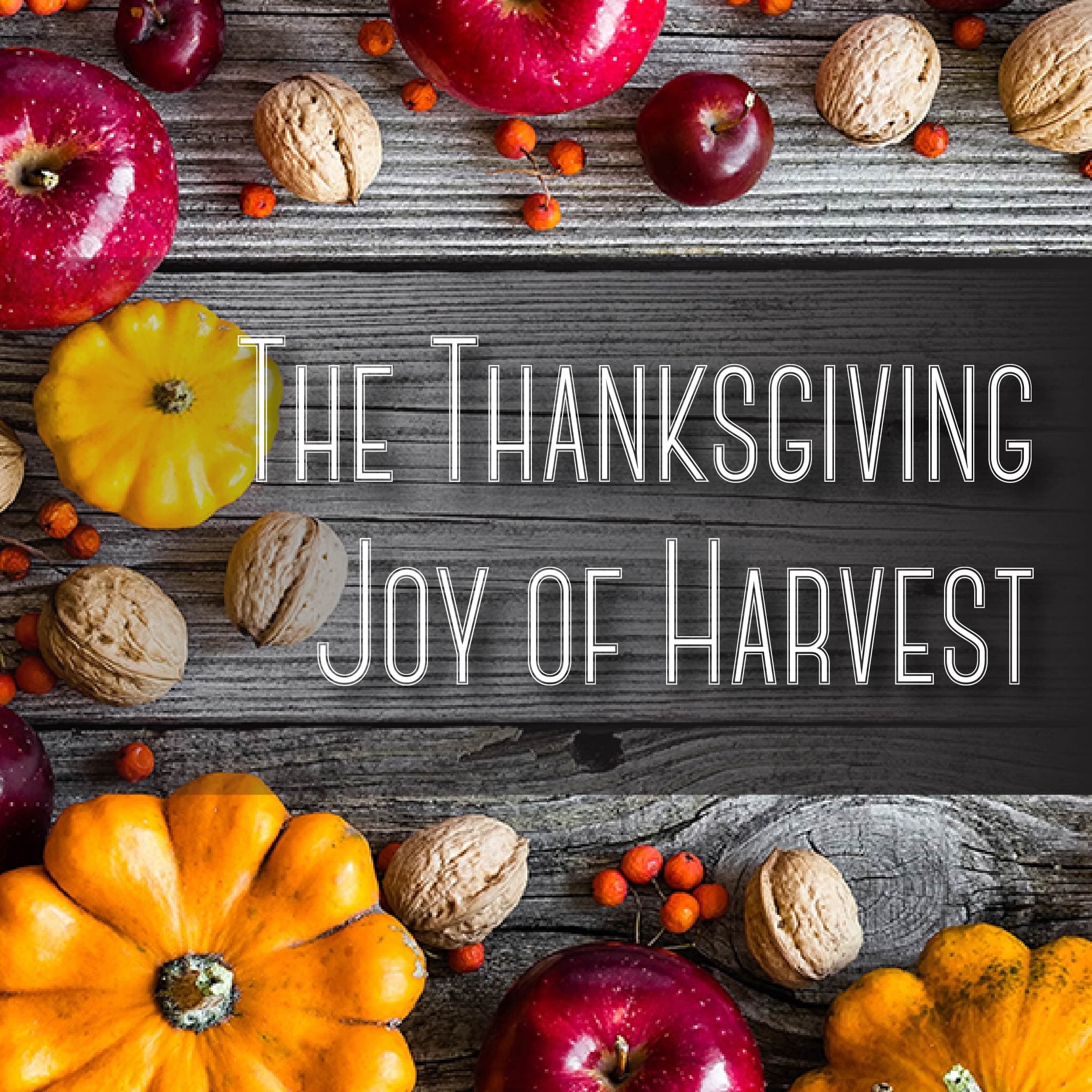The term “harvest” appears frequently in Scripture, as the people of the Bible lived in an agricultural society. At Thanksgiving, the imagery of harvest frames our own nation’s history, inspiring us with things reflective of Early America. Yet Thanksgiving is about more than that. It is a call for us to celebrate not only God’s provision and restoration, but also His promise and presence—even amid delays, restricting circumstances, or tears. Thanksgiving also calls us to constancy, for the journey to harvest will usually be harder than we think, longer than we expect, and more rewarding than we can ever imagine.
Psalm 126 is a song of thanksgiving and reflects on a time of captivity. The word “captivity” occurs twice. The first reflects on the absolute destruction that occurred when Jerusalem fell in the year 586. In the preceding years, the people of Jerusalem had also experienced a sequence of encounters with the strong arm of Nebuchadnezzar’s hosts from Babylon. These armies invaded their nation, took their capital city, and vanquished everything, resulting in tens of thousands of people being carried away from their homeland. They were taken into captivity in Babylon, a long ways away.
But the return from captivity was an awesome moment. The invasion of the Medes and Persians under Cyrus was a climactic victory. The strategy for battle was remarkable. There was no way to get through Babylon’s walled gates, so they dammed off the river and marched in on the riverbed. Entering by surprise, overnight, the nation fell. It was a remarkable turnaround.
Cyrus had no sooner come to power than he was shown the prophecies of Isaiah, 200 years earlier, that said God would bring His servant, Cyrus, to set His people free. It may have been superstition on Cyrus’ part because he did not fear the living God, but he did respect that his name appeared in the prophecies. With no reason to hold the people from Jerusalem captive any longer, he set them free.
When the Lord brought back the captivity of Zion, we were like those who dream. Then our mouth was filled with laughter, and our tongue with singing…The Lord has done great things for us, and we are glad. – Psalm 126:1-3
They had been held captive so long and then, suddenly, they were on their way home. It was a long trip that would have taken weeks, perhaps even months to prepare for, but it happened, and they returned home to Jerusalem singing this song. It is a message of hope to those of us for whom the spirit of thanksgiving might not seem to prevail because we’ve been struggling with difficult circumstances for such a long time.
Bring back our captivity, O Lord, as streams in the South. – Psalm 126:4
This is a direct reference to the Negev Desert and the rivers that come suddenly. It is much the same terrain as in Southern California, where the arroyos will suddenly be filled with water, and then just as quickly, become dry again. But the subterranean cavities have been filled, and the oases begin to blossom once more. The message to us is that even when you’re traveling through the desert, there is water.
Here is the second use of the word “captivity.” The Hebrew word shabah literally means “to carry away,” and it is indicative of four things that can happen in our lives as well:
(1) To be carried away: Like someone who is helplessly carried away from the scene of an accident, and there’s nothing they can do about it.
(2) To be led away: People who were vanquished in the ancient world were tied together with ropes around their neck—ropes that could chafe, even strangle. So there’s not only helplessness, but also embarrassment at being led away like that.
(3) To be driven away: Even when what you seek is within your reach, a force of adverse opposition pushes you back, as though circumstances slap your hand.
(4) To be taken away: The term “thief” for Satan is a legitimate description of the ongoing activity of the Adversary who comes to steal, kill, and destroy.
In the midst of these dramatic events, the Psalmist recollects that suddenly, it all turned around and “our mouths were filled with singing.” Here is the exhortation to us, recorded by the Spirit of God in the eternal words of Scripture.
Those who sow in tears shall reap in joy. He who continually goes forth weeping, bearing seed for sowing, shall doubtless come again with rejoicing, bringing his sheaves with him. – Psalm 126:4-6
The song also has a message for those whose hopes have not yet been fulfilled. Try to see the picture: The tears with which they sow are not just tears of people who are experiencing pain, though it obviously could reflect on that, but of people who are sowing seed with wind and dust blowing in their face. And they must be thinking, This is not the day to sow. But the song is saying, Though the winds of adversity blow, keep sowing in faith.
We’ve all seen pictures of the ancient method of sowing—huge bags slung over the shoulder of the person in the field. They’re reaching in and scattering the seed. And it says literally in the Hebrew text they are going forth with multiple sacks of seed. Though the wind blows, though the work is long and hard, though the harvest seems improbable, and even though their seed is getting blown away, they just keep sowing.
God’s Word says that those who sow in tears shall doubtless come again with rejoicing. Father God is saying, “Though it seems to be a difficult time, you will not only come again and see the harvest, but also you will come rejoicing.” You and I will also face difficult times in which the commitments, responsibilities, and disciplines we’ve learned come to an uncomfortable point of application—when it seems that everything is adverse to our trusting in and living out the Word of God. But Scripture says, “Though weeping may endure for a night, joy comes in the morning” (Ps. 30:5).
A celebration of God’s purpose through and beyond trial
For many of us, it’s been a demanding year. But as you and I come to Thanksgiving, the joy of celebration makes everything else incidental. When we finally see the harvest, it no longer matters how tough things were, how much time they took, or how heavy the pressures were—what’s important is that we have answered the call to faith. The joy is there. The Bible likens this joy after travail to a woman who has delivered a child. After the difficult months of pregnancy and the pain of labor, the baby is born, and what it took for that to happen doesn’t matter anymore—there is only rejoicing.
This song is a celebration of God’s purpose through and beyond trial. It reminds us that triumph ultimately outlasts trial. And the triumph is en route, folks. Even if we can’t see what God is doing, there’s evidence in our hearts that He will be faithful. This song is an invitation to constancy of focus—to go forth with sacks of seed, not just one.
What are you sowing?
Seed is the promise of the Word of God, which lives and abides forever. It’s up to me to decide that I will not retreat from the promise. Even with the wind in my face, the sand in my eyes, the weeping from circumstance or adversity, I will keep sowing the promise of God. Not as one who is mindless or superstitious, but as one who knows that the God who makes a promise to His people never forgets it.
And so we come with thanksgiving, bringing our “sheaves” with us.
When I was a little boy, in the days before we had a clothes dryer in the house, my Mamma used to hang the laundered sheets on the line the long way, with one fold. I couldn’t reach the clothes pins on the line, so she hung them up. But when it came time to go out and bring the clothes in, she would have me go with her. She would give me the end of the sheet to hold off the ground until she got done taking it off the line. Then we would fold the sheet together. I would put it in the basket while she went on to the next sheet. We would bring in the sheets this way every week, and it was a strong picture in my life.
One day in Sunday School, we sang a song which some of you may remember: “Sowing in the morning, sowing seeds of kindness, sowing in the evening…” It says, “We shall come rejoicing, bringing in the sheaves.” And I came home and told my Mamma we sang this song about bringing in the sheets. I really thought that was what the song was about. It seemed so relevant to my life.
Loved one, Father God wants you to come and walk along with Him. He wants you to see that it’s the reverse of my childhood experience with my Mamma and the clothesline: There are things of circumstance that are folded up; we can’t see everything that’s in there. But when they unfold, we’ll see it all, and we will come rejoicing, with arms full of His abundance.
Join me in opening up to this expectation. God has done more things of love and goodness in our lives than any of us can imagine. When you face the thing that hasn’t happened yet, keep sowing. And with the assurance of God’s promise, expect the joy of His harvest.
Copyright © 2008, 2010 by Jack W. Hayford, Jack Hayford Ministries.
Our gift of this teaching article by Pastor Jack Hayford is made possible by your gracious support of the ministry. Partner with us online or call toll-free 1-800-776-8180 to donate (within the U.S.).



